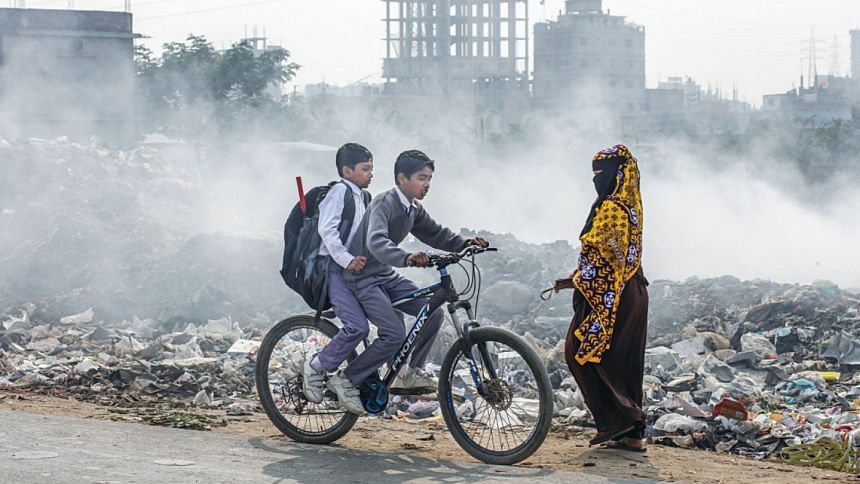World Air Quality Report 2020: Bangladesh most polluted

Air quality of Bangladesh was the worst in the world, while its capital Dhaka was the second most air polluted city in 2020, said a global report.
"South Asia remained the most polluted region of the world with Bangladesh, India and Pakistan sharing 42 of the 50 most polluted cities worldwide," shows new data from IQAir's global air quality data platform in its World Air Quality Report 2020.
The report published yesterday said the average annual PM 2.5 concentrations in Bangladesh was 77.1 microgrammes per cubic metre (mcg/m3) of air, which is seven times above WHO exposure recommendation.
Researchers from IQAir -- a global air quality information and Swiss-based tech company -- analysed pollution data from 106 countries, specifically measuring PM 2.5, a microscopic pollutant that can cause serious health risks.
"An estimated 13-22 percent of deaths in this region are linked to the health effects of air pollution exposure, with associated estimated costs equating to 7.4 percent of the region's GDP," the report said.
Experts said Bangladesh has ranked top of the worst polluted countries since 2018 and this result showed that the situation did not improve in recent years.
"Basically, we did not see any concrete steps that can help reduce the air pollution. Even if there are some steps taken by the government to improve the air quality, it seems that the steps are not enough," Prof Abdus Salam, of Dhaka University's Chemistry department, told The Daily Star yesterday.
Salam, who is an air quality expert, said due to the pandemic, transport-related air pollution dropped around 80 percent only in April last year as there was countrywide lockdown, but the situation started getting worse again when the lockdown was withdrawn.
In 2020, all Indian cities that were monitored observed air quality improvements compared to 2018, while 63 percent saw improvements over 2019.
The report said with annual average PM 2.5 concentrations of 77.1 microgrammes per cubic metre, Dhaka ranked the second most polluted capital cities in the world, while Delhi with an average annual PM 2.5 concentrations of 84.1 microgrammes per cubic metre topped the list.
"The connection between Covid-19 and air pollution has shone new light on the latter, especially as many locations have observed visibly cleaner air -- revealing that air quality improvements are possible with urgent, collective action," the report said.
According to the report, only 24 out of 106 monitored countries met World Health Organisation (WHO) annual guidelines for PM 2.5 in 2020.
"The year 2020 brought an unexpected dip in air pollution. In 2021, we will likely see an increase in air pollution due to human activity again," said Frank Hammes, CEO of IQAir.
"We hope this report will highlight that urgent action is both possible and necessary to combat air pollution, which remains the world's greatest environmental health threat."
Lauri Myllyvirta, lead analyst at the Centre for Research on Energy and Clean Air (CREA), who also contributed to the report, said many parts of the world experienced unprecedented, but short-lived, improvements in air quality in 2020, as restrictions related to the Covid-19 pandemic caused a steep drop in fossil fuel consumption.
An official of the Department of Environment told The Daily Star that due to the lockdown, air quality improved in April and that continued till August. "But from October when the dry season began, the situation is getting worse," said the official, wishing not to be named.
The official said the government had taken various steps to contain the air pollution, including regular mobile drive against the polluters.

 For all latest news, follow The Daily Star's Google News channel.
For all latest news, follow The Daily Star's Google News channel. 








Comments